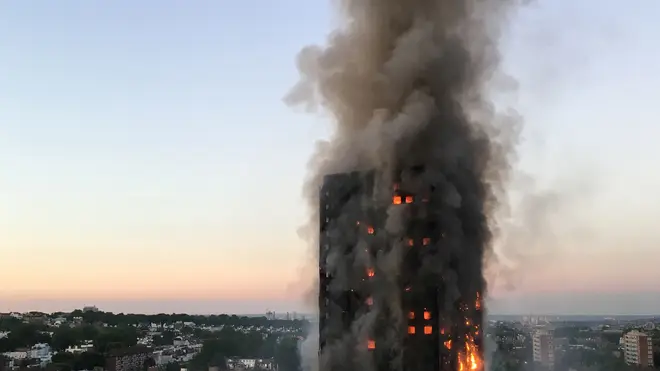
James Hanson 4am - 7am
4 January 2025, 10:59 | Updated: 7 February 2025, 20:43

A union boss has called for better government recognition of industrial diseases after a Health Minister vowed on LBC to try ‘resolve’ his calls for regular health checks for firefighters following the Grenfell disaster.
The alarm was raised by a scientific study published this week, which found a quarter of firefighters who attended the tower block inferno in North Kensington now have life-changing illnesses, including cancer and respiratory illnesses.
Yesterday the Deputy Prime Minister Angela Rayner confirmed that Grenfell Tower will be 'sensitively' demolished over the course of the next two years, in a move which has outraged some of the families of the victims and survivors of the tragedy.
However, some residents are calling for the demolition to be halted with a petition.
Fire Brigades Union boss Matt Wrack welcomed the assurances made by Public Health and Prevention minister Andrew Gwynne in an interview with Matthew Wright on Friday to speak with the Fire Safety Minister and ‘look at’ his calls for regular check-ups with medics.
He also praised Health and Social Care Committee Chair Layla Moran MP who also told LBC News that the affected workers could be eligible for compensation.
Mr Wrack, told LBC today: “We need to see the removal of any obstacles to the recognition of work-related cancers and other diseases as industrial illnesses for firefighters.
“It's welcome that the health minister Andrew Gwynne has said that the government 'needs to seriously look' at this issue.
“The FBU also welcomes the remarks from Westminster's health and social care select committee chair, Layla Moran, suggesting that there could be a case for compensation for firefighters living with these debilitating conditions.
Read more: Major Grenfell study reveals one in four firefighters suffering life-changing health conditions
Read more: Labour pledges to fix all Grenfell-style cladding on Government-funded buildings in five years
“Any entitlement to compensation would be assisted by the recognition of relevant industrial diseases.
“However, there must be no ifs or buts when it comes to supporting those suffering from these devastating disorders.
“We need a very clear plan to significantly enhance health monitoring to protect the lives of firefighters and the public.
“Anything less would be a betrayal of the many firefighters at Grenfell who are now living with serious health conditions.”

Mr Gwynne, responding to the FBU’s concerns, told LBC on Friday: “Certainly that’s something that I’m more than happy to take away and look at seriously because we recognise that people who go above and beyond putting their own lives at risk in situations like Grenfell Tower may well end up with health issues as a consequence of their own work.
“I’m more than happy to speak to the fire minister in government as well to see how we can try and resolve that.”
Layla Moran, when asked by LBC News presenter Simon Conway if the UK is letting down our emergency workers after the news of Grenfell firefighters suffering long-term health impacts, said: "I’d start by saying if we are, we’re letting them down again.
"Because a similar thing happened during the pandemic didn't it and we had so many healthcare workers who lost their lives but actually many who are still suffering from Long Covid and it continues to be a battle to get them the compensation frankly that they deserve, because these are - as if we were in a war - these are our frontline fighters against a killer.”
“And in the case of these firefighters, it will be the same thing. There should be schemes - and there are schemes - that assess that occupational risk.
"It can be very, very difficult to get that compensation in place. But it would strike me as self-evident that if you have a frontline worker who's put their own life on the line in order to save the lives of others then the very least we owe them as a society is to make sure that they're taken care of if they get ill as a result."
A report published on Friday in the Journal of Occupational and Environmental Medicine co-authored by toxicology expert, Professor Anna Stec from the University of Central Lancashire, surveyed the health of 524 of the 628 firefighters who attended the blaze in the first 20 hours, which claimed the lives of 72 residents seven-and-a-half years ago.
Of those monitored, 136 firefighters reported life-changing health condition including 11 cases of cancer, 64 respiratory diseases, 22 neurological disorders and 66 digestive illnesses.
Of those disclosing long-term health problems, 89 per cent had not worn respiratory protection at all times during the disaster due to the urgency of their work to save lives and battle the out-of-control toxic flames.
Scientists are working to establish whether attending the fire and the diseases suffered by firefighters could be linked.